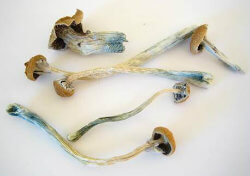-
About
- Health
-
Patient Care
I Want To...
-
Research
I Want To...
Find Research Faculty
Enter the last name, specialty or keyword for your search below.
-
School of Medicine
I Want to...
'Magic Mushrooms' Help Longtime Smokers 'Quit - 09/11/2014
'Magic Mushrooms' Help Longtime Smokers 'Quit
More research is still needed to test the role of psilocybin in helping people quit
Release Date: September 11, 2014

Dried Cubensis (Magic Mushrooms)
Credit: Erik Fenderson, via Wikimedia Commons
Johns Hopkins researchers report that a small number of longtime smokers who had failed many attempts to drop the habit did so after a carefully controlled and monitored use of psilocybin, the active hallucinogenic agent in so-called "magic mushrooms,” in the context of a cognitive behavioral therapy treatment program.
The abstinence rate for study participants was 80 percent after six months, substantially higher than typical success rates in smoking cessation trials, says Matthew W. Johnson, Ph.D., an associate professor of psychiatry and behavioral sciences at the Johns Hopkins University School of Medicine and the corresponding author on the study.
Approximately 35 percent experience six-month success rates when taking varenicline, which is widely considered to be the most effective smoking cessation drug. Other treatments, including nicotine replacement and behavioral therapies, have success rates that are typically less than 30 percent, Johnson adds.
But the researchers, in a report on the study, published online on Sept. 11 in the Journal of Psychopharmacology, strongly caution that their study results are not an endorsement of do-it-yourself psychedelic drug use for smoking cessation, but instead are specific to the controlled administration of the drug in the context of a treatment program involving cognitive behavioral therapy.
“Quitting smoking isn’t a simple biological reaction to psilocybin, as with other medications that directly affect nicotine receptors,” Johnson says. “When administered after careful preparation and in a therapeutic context, psilocybin can lead to deep reflection about one’s life and spark motivation to change.”
Study participants were 10 men and five women, all mentally and physically healthy. They were an average age of 51; smoked, on average, 19 cigarettes a day for 31 years; and had repeatedly tried and failed to stop smoking. Ten participants reported minimal past use of hallucinogens, with the most recent use being an average of 27 years before study intake. Five had never used hallucinogens.
After researchers informed subjects about what their experience with the drug might be like, the first dose of psilocybin was administered by pill the day each participant planned to quit smoking. Two subsequent sessions, with higher doses of the mind-altering drug, were held two weeks and eight weeks later.
During each psilocybin session, which lasted six to seven hours, participants were closely monitored by two members of the research team in a comfortable, homelike setting. Most of the time, participants wore eyeshades and earphones that played music, and they were encouraged to relax and focus on their inner experiences.
The hallucinogenic compound was administered as part of a comprehensive cognitive behavior therapy smoking cessation program that included weekly one-on-one counseling sessions and techniques such as keeping a diary before quitting in order to assess when and why cravings occur.
The researchers, who are part of a team that has long had federal funding to study the psychoactive effects of psychedelic drugs, suggest psilocybin may help break the addictive pattern of thoughts and behaviors that have become ingrained after years of smoking. The benefits also seem to last after the drug has worn off.
Johnson's next study will compare smoking success rates for people who take psilocybin versus those who use nicotine patches. He will use MRI scans to study brain activity in participants.
Co-authors include Albert Garcia-Romeu, Mary P. Cosimano and Roland R. Griffiths, all of the Johns Hopkins University.
The Beckley Foundation provided initial funding for the research, with continued funding from the Heffter Research Institute. Support for Garcia-Romeu was provided by National Institute on Drug Abuse grant T32DA07209.



